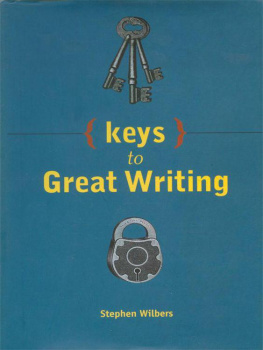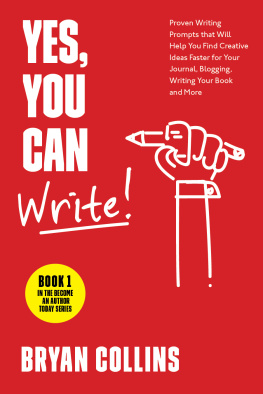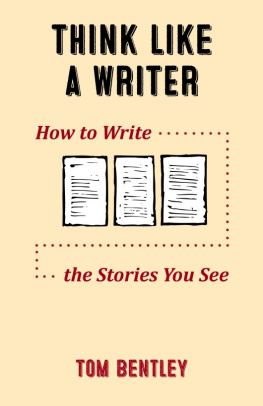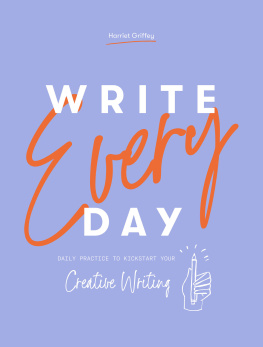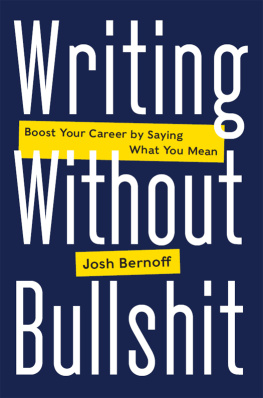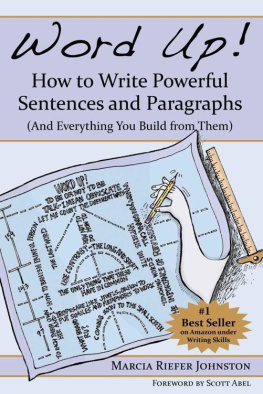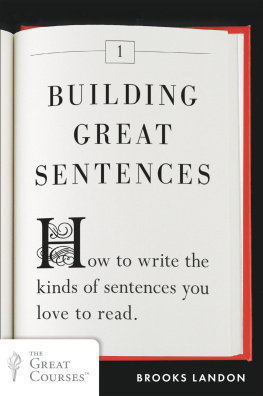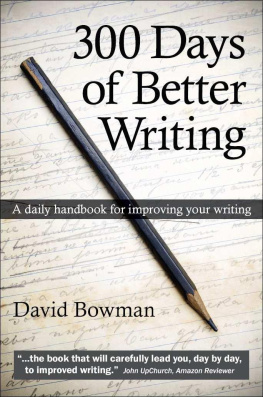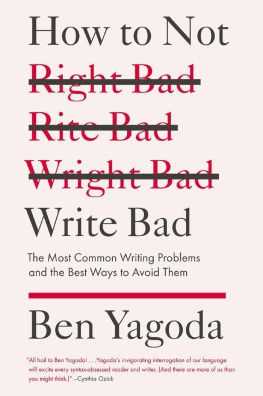Mastering
the
Craft of Writing
How to Write with Clarity,
Emphasis, & Style
Stephen Wilbers
DEDICATION

To Matilda, my Birkie baby, with love.
My mother pointed out that one could not say a green great dragon, but had to say a great green dragon. I wondered why, and still do.
J.R.R. Tolkien
I was inspired by the marvelous example of Giacometti, the great sculptor. He always said that his dream was to do a bust so small that it could enter a matchbook, but so heavy that no one could lift it. Thats what a good book should be.
Elie Wiesel, in reference to Night, his memoir about the Holocaust, whose manuscript he edited from 865 pages down to 245 pages, and later down to 178 pages, and finally to 116
In the afternoons he caught sight of Lily when she cleaned the upstairs of the house. Just seventeen years old. Her sand-colored hair. Her eyes ledged with freckles. He closed his door, sat to write. He could still see her shape. On the stairs he allowed her to pass. A whiff of tobacco came from her. The world was made ordinary again.
Colum McCann, TransAtlantic
CONTENTS


INTRODUCTION

As I was thinking about writing this book, I kept hearing Katherine Anne Porter telling me, You do not create a style. You work and develop yourself; your style is an emanation from your own being.
Sort of took the wind out of my sails.
I also heard Kurt Vonnegut saying, Find a subject you care about and which you in your heart feel others should care about. It is this genuine caring, not your games with language, which will be the most compelling and seductive element in your style.
You can see why I had my doubts about writing this book.
I was afraid if I compiled a list of techniques to help you write with style, you might think, Hey, this is easy. Ill just do these simple things, and Ill be a great writer. The heck with reading or working on my writing over time.
I was worried you might conclude that style was nothing more than a suit of clothes to be donned for the occasion rather than an authentic expression of your inner beingthe Self, as E.B. White describes it, escaping into the open.
For example, what if I taught you how to use a sentence fragment to punctuate a point, as Stephen King does when he writes, If you dont have time to read, you dont have the time (or the tools) to write. Simple as that? You might think stylistic technique was nothing more than a bag of tricks. And what if I showed you how to make a sentence more memorable by arranging its elements in climactic order, with the most emphatic element coming last, as Harvard President Charles William Eliot did in 1871 when he declared, Bad spelling, incorrectness as well as inelegance of expression in writing, ignorance of the simplest rules of punctuation, and an almost entire want of familiarity with English literature are far from rare among young men of eighteen otherwise well prepared for college? You might think, Great! Now I know how to use climactic order for emphasis, and then go watch TV rather than read a good book.
Well, I decided not to do it. I couldnt have that misconception on my conscience. I decided you would have to develop your style the hard way, the way countless writers before you have done it. You would have to read, work, and study the style of good writers, and, slowly, over time, your style would improve.
Then I had second thoughts.
I thought of the books that have helped me improve my writing. I thought of the readers of my newspaper column on effective writing who have told me theyve learned from my advice and appreciated my humor. I thought of the people who have told me my earlier book on style, Keys to Great Writing, had helped them develop their writing skills. Then there were the students who have taken my classes at the University of Iowa, Hamline University, and the University of Minnesota and all the participants in the training programs Ive offered to various companies, agencies, and organizations, and I thought that maybe I do know something that might be helpful to you.
So I decided to risk writing this book. But I still dont want you to think that learning to write with clarity, emphasis, and style is easy. Its not. Its hard work. Its challenging, arduous, and sometimes tedious. On the other hand, dont be surprised if a smile comes to your face as you make your way through these fifty-two techniques. You might even hear someone laughing.
Youll notice that my examples and exercises run the gamut from creative writing to business writing. My techniques are intended for every type of writer, from students writing college application essays to scientists explaining their research findings, from journalists and attorneys to governmental, academic, medical, and environmental writers. Climactic order works as effectively in the courtroom as it does in a text message, a love letter, or a story about a character waking up one morning and discovering he has metamorphosed into a large, monstrous, insect-like creature.
My exercises will give you practice applying each technique. The concluding summary of all fifty-two weeks techniques will help you remember them for the rest of your life. For some commentary along the way, both serious and light-hearted, Ive drawn from my cache of nine hundred newspaper columns. (In deciding to include some of my previously published work, Im following the advice of my favorite professor at the University of Iowa, the transcendentalist scholar Sherman Paul, who encouraged his students to recycle their literary wares.)
So thats my plan.
Now heres what you need to do: Listen.
Listen to the sound of your words.
The good writer of prose must be part poet, says William Zinsser in On Writing Well, always listening to what he writes.
Listen to the rhythm and cadence of your sentences, and youll know whats working and what isnt. Trust your ear.
Thats all you need to do.
That, combined with a lifetime of reading, writing, and experimenting with various patterns of language, will make you a good writer. If you work hard and if you were born with at least average intelligence and some measure of talent, you might even become a great writer.
These fifty-two techniques will help you realize what youre doing right. Theyll help you recognize your natural patterns, the ones that are working for you, and expand your repertoire of sentence styles and structures.
I recommend you read this book twice. The first time through, read only the fifty-two techniques and skip the Exercises and Further Thoughts. The second time through, read everything. Take your time. Devote one week to each of the fifty-two techniques. Begin working on a new technique every Monday. Look for opportunities to apply that technique in everything you write. Look for examples of its application in everything you read. Note missed opportunities. Be alert. Keep your eyes and ears open. Billboards and restaurant histories printed on the backs of menus are not off limits.


